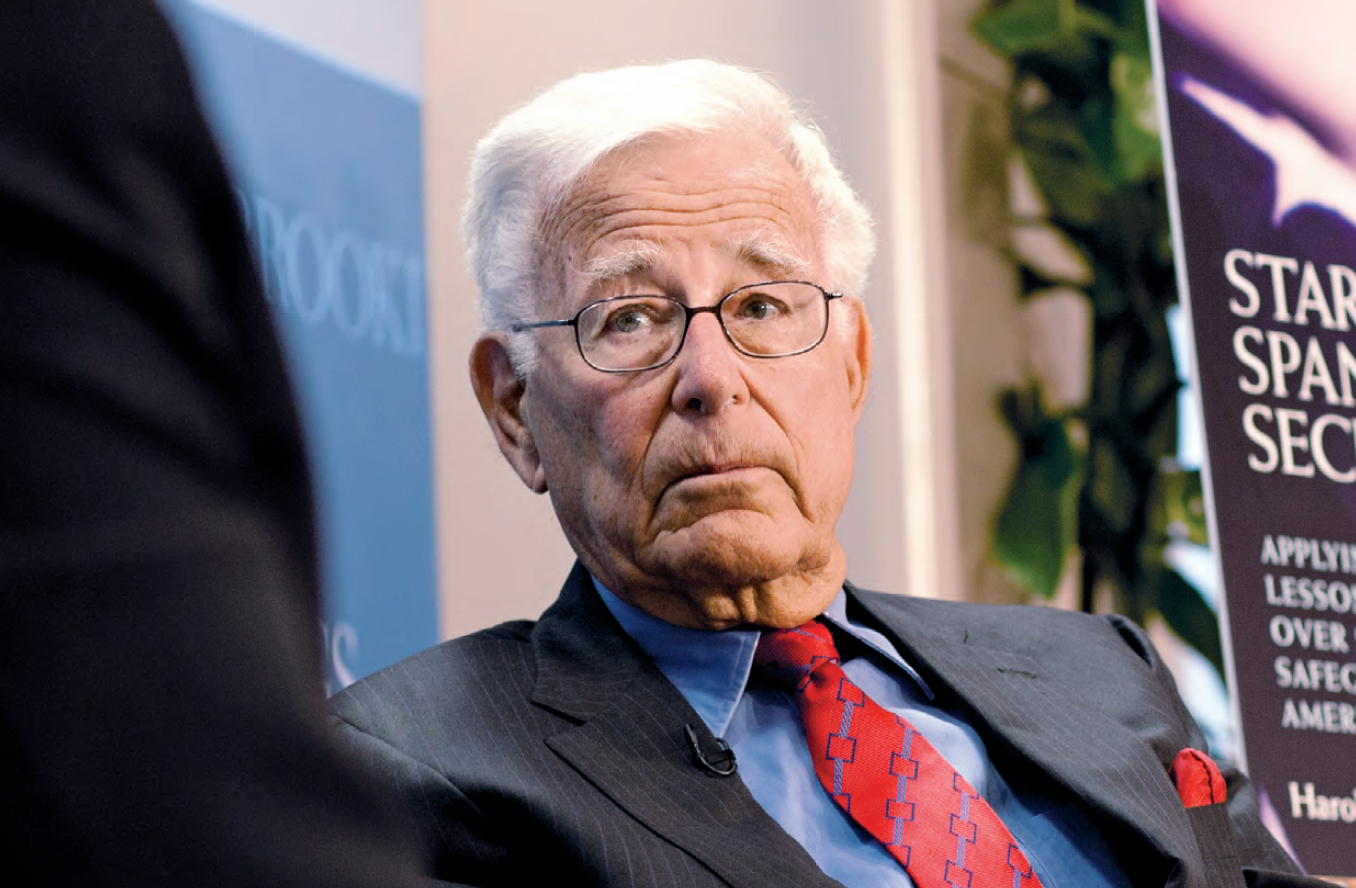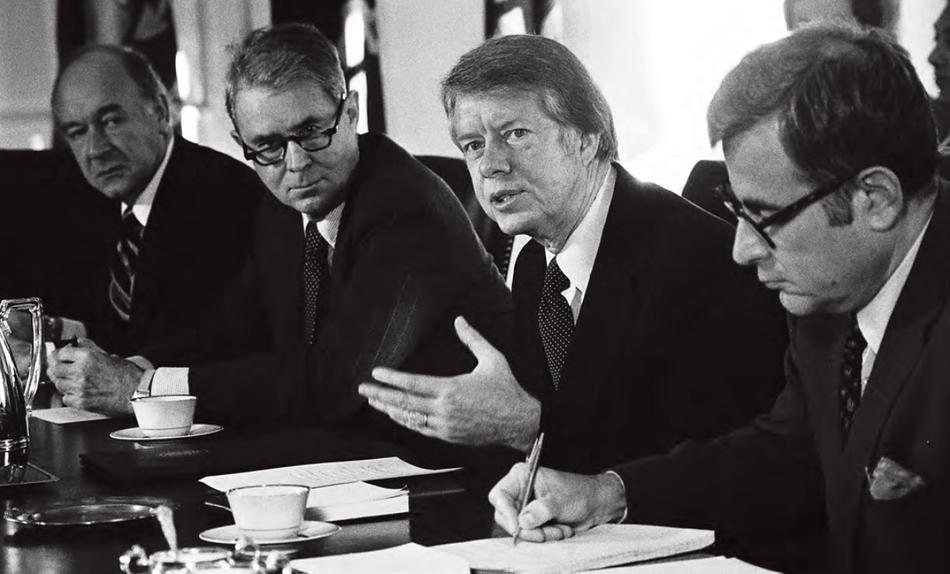
Your new book Star Spangled Security reminds us that the world was a tense place when you began your term as secretary of defense.
Yes, the Cold War was pretty warm in those days. There had been a period of détente during the Nixon years, but the Soviets kept building up their nuclear forces, and they seemed, at least to some people, to be trying to gain predominant influence in Africa, Latin America, and even the Middle East.
The Soviet Union posed an existential threat. Did that fact always weigh on you?
There were two pieces to that. One was the threat of a nuclear attack. As the Soviets ratcheted up their nuclear capabilities, that concern was always present in the room. When they moved their ballistic-missile submarines closer to our east coast in 1978, reducing our warning time, it concerned us enough that we increased the readiness of our bomber force. We also worried about the increased accuracy of Soviet land-based ballistic missiles, which could affect the survivability of our land-based missiles. That preoccupied me because I had primary responsibility for responding to those Soviet buildups in a way that preserved our deterrent capability.
The other piece was geopolitical competition. I was less inclined to see this as a threat because it was clear the Soviet economic and political system wasn’t working too well.
It was clear even in the late 1970s?
It was pretty clear to me and to the rest of us in the Carter administration. Moreover, though our military capabilities had suffered depletion during the near decade of the Vietnam War, if you asked which country could really move forces a long distance and rapidly, it was the US, not the Soviet Union.
How real was the possibility of a land-based, conventional European war?
It was a considerable worry. After the US, Europe was the biggest center of economic production, and it was where the Soviets were poised for potential conquest. They had a large ground force, much larger than the combined forces of the Western Europeans and the US. When I came to office, it was the first thing that I concentrated on, because that’s where the perceived imbalance of capabilities was greatest. We could get to Africa or Latin America rapidly and outdo the Soviets, but in Europe they were right on the inner German border of a then-divided Germany. The general view, which the Soviets clearly believed, was that they could roll over NATO forces, US forces, and Western European forces to the English Channel within a couple of weeks.
With so great an imbalance, what part did nuclear arms play in the equation?
Before we changed the balance of forces in Europe, the strategy was to deter a Soviet attack on Western Europe by the threat of nuclear escalation. There were all sorts of theories and plans to use tactical nuclear weapons if the Soviets started an invasion. The hope was that it would cause them to pull back or at least stop. More likely, they would have responded with nuclear weapons and it would have escalated to a general nuclear war, which would have destroyed Europe and the US and the Soviet Union. Even if it hadn’t escalated to all-out nuclear war, who knows how it would have turned out.
Whether the Soviets were deterred, or whether they decided that it was too dangerous, which is not quite the same thing, is not clear. I think their intention was at least to overawe the Western Europeans by a predominant conventional and nuclear capability and somehow use that to gain political power in Western Europe. That didn’t work.
Those who didn’t live through the Cold War may be baffled by the idea of developing and deploying new weapons in order to limit the risk of war. This was called mutual assured destruction, or MAD.
You’re asking about psychology. Does the threat of mutual suicide deter a potential enemy? I think the answer is that it did.
Foreign policy might have been simpler when the US lived in a world with one big enemy. Has the world grown too complex for that?
We no longer have that relationship with Russia, and we don’t have it with China. I expect we will not quite have it with China, even if we become more adversarial. The Chinese know our history with the Soviet Union, and we both realize that it doesn’t make sense to get into a mutual-suicide deterrent approach.
You do see it with other countries. Look at the Israelis and the Iranians, look at the Indians and the Pakistanis, and you see the same thing operating. It’s possible that there could be a nuclear war. What prevents it? The thought that it would mean mutual suicide. That’s how it was between the US and the Soviet Union.
Is it the same with North Korea?
North Korea is an interesting example. I don’t think so far they have gained anything by having nuclear weapons, except perhaps attention. They know that if they use nuclear weapons, that’s the end of the regime and probably of the population as well. It does allow them to posture and occasionally to behave violently, but that’s something we live with. They’ve been bribed several times, but mostly because of fear that they could start a conventional war with South Korea. They could wipe out Seoul or at least damage it severely without nuclear weapons. The South Koreans aren’t worried about North Korean nuclear weapons; they’re worried about North Korean artillery.
Do you foresee war on the Korean Peninsula?
I don’t think so. I see them heading for another round of talks at some point. But whether they’ll be bought off and to what extent, I don’t know. The North Koreans have boxed themselves in. They have made so many threats that if they don’t do anything, they look not-serious. On the other hand, if they do anything in the way of an attack on some South Korean island or outpost, there is sure to be retaliation. North Korea seems to have finished its temper tantrum for the moment.
The other nuclear question mark is Iran.
Unlike North Korea, Iran is a real country. Along with Turkey, it’s the major country in that general region, with a long history and a real future. Iran will be around for a long time, and it’s going to be very influential in its area, unlike North Korea.
The immediate question is, to what extent can Iran be deterred from acquiring nuclear weapons? They want the potential to have them on short notice at the very least. I suspect we probably would be prepared to offer some reduction in sanctions in return for their holding short of a nuclear-weapons capability, defined as having nuclear weapons, not potentially having them. The president has made a fairly strong commitment to preventing them, but I don’t think he or anybody else of authority in the United States is prepared to have another Iraq-type war to prevent it. There are other ways to sabotage Iran’s nuclear capability, but that’s a separate issue.
You’ve said that military action against Iran would at best slow down the development of nuclear arms and harden the population against us.
My view is that it would delay it but make it more certain.
Where do you think Syria is heading?
Into chaos. As that conflict continues, extremist Islamic elements may well gain predominant power in the opposition to Assad. His support from Iran and Russia could preserve his control of part of Syria. And the conflict risks spreading beyond Syria. The hope on the US side was that some regional powers — the Turks, the Saudis — would use their influence and take charge and support groups that would gain power and influence. That seems not to have happened. I’m sure there are Saudis supporting Islamist radical groups, which is not much help. The Turks, who are in many ways the natural power to try to influence things, since they used to run the country, haven’t done so.
We would need to be sure we understood the situation before getting drawn in. Iraq and Vietnam are examples of US involvement on the ground when the past was not fully understood by the people who made the decisions. The forces were not properly assessed. Syria is another such case.
We should not commit to doing something without knowing just how we are going to do it. Assad should go, but there are a lot of elements in the opposition who are not our friends.
As secretary of defense, how did you strike the balance between being a policy person and being an implementation person? It seems as though you had a heavy hand in both aspects.
Like it or not, I think the secretary of defense should do the job of running the department. If he doesn’t, he can leave most of it to the deputy secretary of defense, and that has on occasion happened. It couldn’t happen with me because I’m a hands-on person. I had spent eight years in the Defense Department before and had run some things, and it was inevitable that I would resume making program decisions, starting initiatives with weapons programs and with procurement policy. When it came to weapons decisions, my instinct was to work hard on those and to oversee them and initiate strongly.
The secretary of defense has no choice but to deal with other countries. That automatically gets you into the US security-policy issues.
Does that blur the line between the Department of Defense and the State Department?
State and Defense often disagreed, but the fact that Secretary of State Cyrus Vance and I were old friends helped. State Department people tend not to be decisive decision makers. For them, a negotiation is a success no matter what happens.
You’ve written about the difficulties that some secretaries of defense have had in their second terms. Ronald Reagan defeated Jimmy Carter in 1980, so you didn’t have to face that possibility. Should there be a one-term limit for secretaries of defense?
Well, my own judgment is that anyone who has served longer than four and a half years has come to a bad end.



